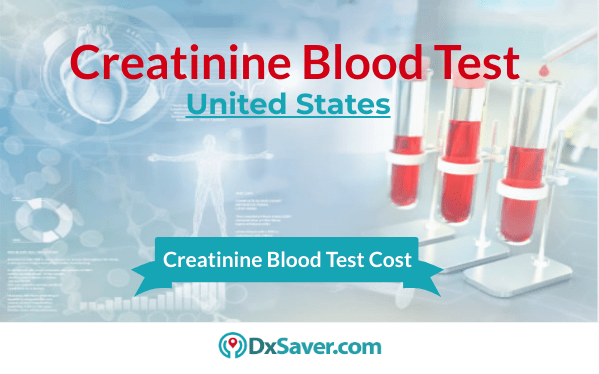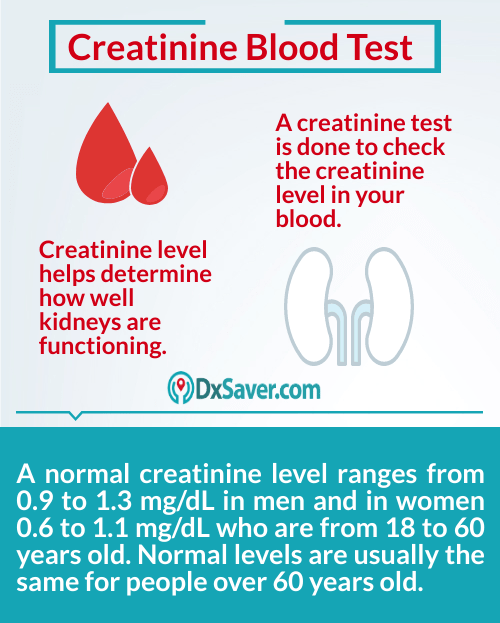
A creatinine blood test is done to measure the creatinine level in your blood. Creatinine is a waste substance that forms when creatinine, which is found in the muscles. Creatinine level in your blood helps your physician determine information about how well your kidneys are functioning.
- Creatinine blood test cost.
- What is a Creatinine blood test?
- Why is a creatinine blood test done?
- How is the Creatinine blood test performed?
- Is there any preparation required before the test?
- Are there any risks in the Creatinine test?
- What does the Creatinine test result mean?
- Providers locations.
For our readers, who are more interested in knowing the Creatinine blood test cost forehand, we begin with that section.
How much does the Creatinine test cost?
Creatinine test cost ranges between $39 and $49 in different labs and facilities across the U.S. Also the cost varies widely depending on the type of creatinine test i.e.
- Creatinine blood test,
- Creatinine 24-hour urine test or
- BUN/creatinine ratio test
No prior appointment is required. Compare the price, order your test online and visit the nearest lab during lab business hours. Complete the procedure and get the results in your email in 2 to 3 business days. Doctor consultation is also available for further treatment or for any kind of medical advice.
Creatinine blood test
The following table shows the creatinine blood test costs $47 at one of our partner laboratories (CLIA – Certified) network located across the U.S.
Name of our Partner Labs | Book Online |
Personal Testing Lab
| Offer Price$47 |
Creatinine test in urine
The following table shows the creatinine 24-hour urine test costs $47 to $49 at 2 of our partner laboratories (CLIA – Certified) network located across the U.S.
Name of our Partner Labs | Book Online |
HealthLabs
| Offer Price$49 |
Personal Testing Lab
| Offer Price$47 |
BUN/Creatinine ratio test
The following table shows the Blood Urea Nitrogen (BUN)/Creatinine ratio test costs $39 at one of our partner laboratories (CLIA – Certified) network located across the U.S.
Name of our Partner Labs | Book Online |
HealthLabs
| Offer Price$39 |
Cost of creatinine test cost with insurance
Many health insurance policies in the U.S. do not cover the cost of the creatinine blood test. They might cover the cost only when it is done as a part of the preventative health check-up. However, the coverage offered by private health insurance policies and national health insurance programs like Medicare and Medicaid varies widely. So we recommend you to check the coverage of your plan with your insurance company.
Our creatinine testing providers do not accept any kind of health insurance plan. But, if the insurance company accepts to reimburse the cost, they can provide you with an itemized receipt containing all the details like the name and code of the test, and CPT code which is necessary for insurance reimbursement purposes.
What is a creatinine blood test?
Creatinine is one of the substances that your kidney eliminates from your body. Your physician measures the level of creatinine in the blood to check how your kidney functions. A high level of creatinine results in kidney damage and it’s not working properly. Creatinine blood tests are generally performed along with several other laboratory tests that include blood urea nitrogen test and basic metabolic panel or comprehensive metabolic panel. These tests are done to help diagnose a few other diseases and to check for any problems related to the kidney.
Why is the Creatinine blood test done?
Your physician may order for a creatinine blood test to assess the creatinine levels in your blood if you show any sign of kidney disease. These symptoms may include:
- Fatigue and trouble sleeping
- A loss of appetite
- Swelling in the face, wrists, ankles, or abdomen
- Lower back pain near the kidneys
- Changes in urine output and frequency
- High blood pressure
- Nausea
- Vomiting
How is a creatinine blood test performed?
The medical physician will ask to roll up the sleeves to find the vein to inject the syringe to take a sample. They sterilize the injection site with an antiseptic and then tie a band around your arm. This makes the veins swell with blood, allowing them to find a vein more easily. Once they find a vein, they insert a needle into it to collect the blood.
In most cases, a vein on the inside of the elbow is used. You might feel a slight prick when the needle is inserted, but the test itself isn’t painful. After the health physician provider removes the needle, they put a bandage over the puncture wound.
Is there any preparation required before the test?
A creatinine blood test doesn’t require any serious preparation like fasting. You should eat and drink the same as you do usually to get an accurate result. But, it’s very important to tell your physician about any prescription or over-the-counter medications you’re currently consuming. Some drugs may increase your creatinine levels without affecting your kidney function and may interfere with your test results. Let your physician know if you’re under medication like:
- Cimetidine
- Non-steroidal anti-inflammatory drugs
- Chemotherapy drugs
- Cephalosporin antibiotics that include cephalexin and cefuroxime
Your physician may ask you to stop consuming these medications or to reduce the dosage before the test.
Are there any risks in the Creatinine test?
A creatinine blood test is generally not a high-risk procedure. However, you might experience some f ainting at the sight of blood, dizziness, soreness, or redness at the puncture wound, bruising, pain, or infection while the blood is drawn.
Once enough blood is drawn, the specimen is sent to a laboratory for creatinine analysis. Your doctor will give you the results within a few days of testing.

What does the Creatinine test result mean?
Creatinine is measured in milligrams per deciliter of your blood (mg/dL). People who are muscular have higher creatinine levels. Results generally vary upon age and gender. In general, a normal creatinine level ranges from 0.9 to 1.3 mg/dL in men and in women 0.6 to 1.1 mg/dL who are from 18 to 60 years old. Normal levels are usually the same for people over 60 years old.
High creatinine in the blood test
High creatinine levels in the blood indicate that the kidney isn’t functioning normally. The serum creatinine level can be elevated or higher than the normal level due to:
- A blocked urinary tract
- A high-protein diet
- Dehydration
- Kidney problems, such as kidney damage
- A decrease in blood flow to the kidneys caused by shock, congestive heart failure, or diabetes complications
If your creatinine is elevated from an acute or chronic kidney injury, the level won’t decrease until it’s cured. If it was temporarily elevated due to dehydration, a very high-protein diet, then reversal of those conditions will lower the level of creatinine. Plus, a person who is receiving kidney dialysis will have lower levels once the treatment is over.
Low creatinine in the blood test
It’s not common to have low levels of creatinine, but this can occur as a result of a few conditions that may cause decreased muscle mass. A low level of creatinine is not any cause for other health conditions.
Providers Locations
A Creatinine blood test can be done in any of the following locations across the U.S. by visiting the nearest lab.
- Alabama
- Alaska
- Arizona
- Arkansas
- California
- Colorado
- Connecticut
- Delaware
- Florida
- Hawaii
- Georgia
- Idaho
- Illinois
- Indiana
- Iowa
- Kansas
- Kentucky
- Louisiana
- Maine
- Michigan
- Minnesota
- Mississippi
- Missouri
- Montana
- Nebraska
- Nevada
- New Hampshire
- New Mexico
- North Carolina
- North Dakota
- Oklahoma
- Oregon
- Pennsylvania
- Puerto Rico
- South Carolina
- South Dakota
- Tennessee
- Texas
- Utah
- Vermont
- Virginia
- Washington
- West Virginia
- Wisconsin
- Wyoming
Frequently Asked Questions
Will insurance cover my testing cost?
No, insurance will not be covered in the billing. However, they will provide you a receipt for insurance reimbursement purposes.
How should I book my appointment?
You can choose the most suitable provider from above and make an appointment by following the instructions mentioned by them.
Can I cancel my lab test order?
Yes, you can cancel your lab test order anytime before your testing. A refund will be initiated after deducting the cancellation fee. However, cancellation is at the discretion of the provider.
Do the providers offer result interpretations?
Yes, a few providers may provide doctor consultation who will take you through the results and provide clarification if needed.
How do I receive my report?
To ensure your privacy, the test report will be mailed to you by the provider.
Other topics you may also be interested in:-
- Renal panel (Kidney function tests) cost in the U.S.
- Signs and Symptoms of Oral Syphilis
- What is throat cancer?
- Is bacterial vaginosis an STD?
- Is Itching a Symptom of STD?
- What are herpes symptoms in men?
- Cost of Lymphocyte Blood Test in the US
- GGT, Gamma-GT Blood Test Cost in the US
- C-Peptide Normal Levels, Test Results & Treatment
- What are the types of skin cancer?
- Types of STDs that cannot be cured
- Herpes Vs. HPV: Differences, Symptoms, and Testing Cost
- Importance of CA 125 Testing & Ovarian Cancer in Women
- At-home Chlamydia test kit providers and their costs in the U.S.
- How much does the RBC blood count test cost in the U.S?
- Oral STDs: Names, Symptoms, Treatment and Testing Cost
- Anti-aging Testing Cost in the US
- Colon Cancer Stages | Know more about Early Symptoms, Causes & Treatment
- Symptoms of Pancreatic Cancer | More about Causes, Diagnosis & Treatment






